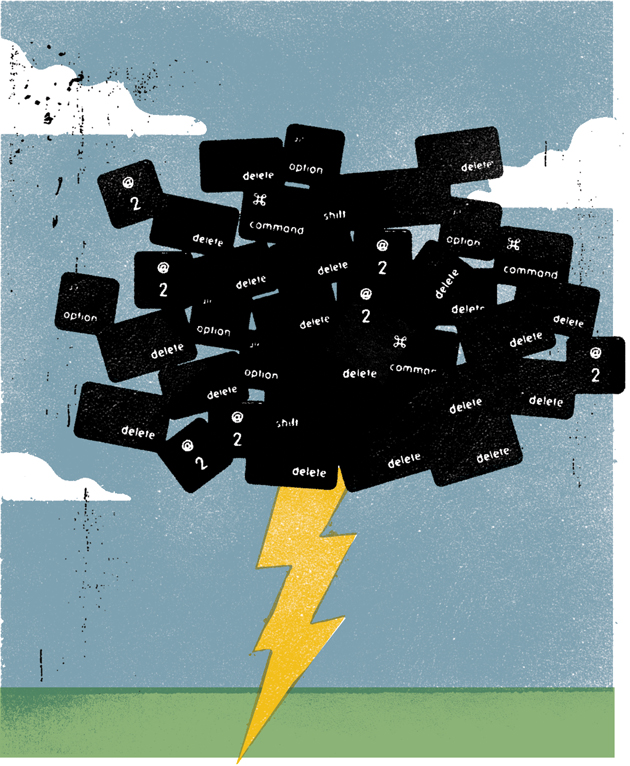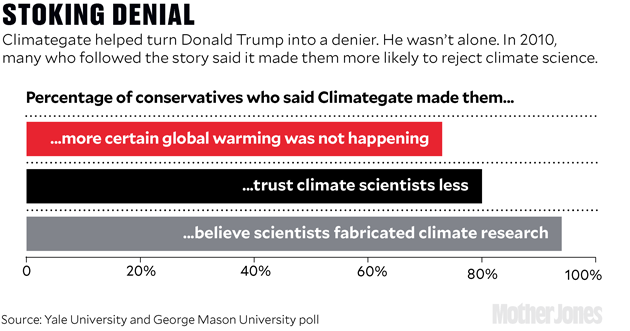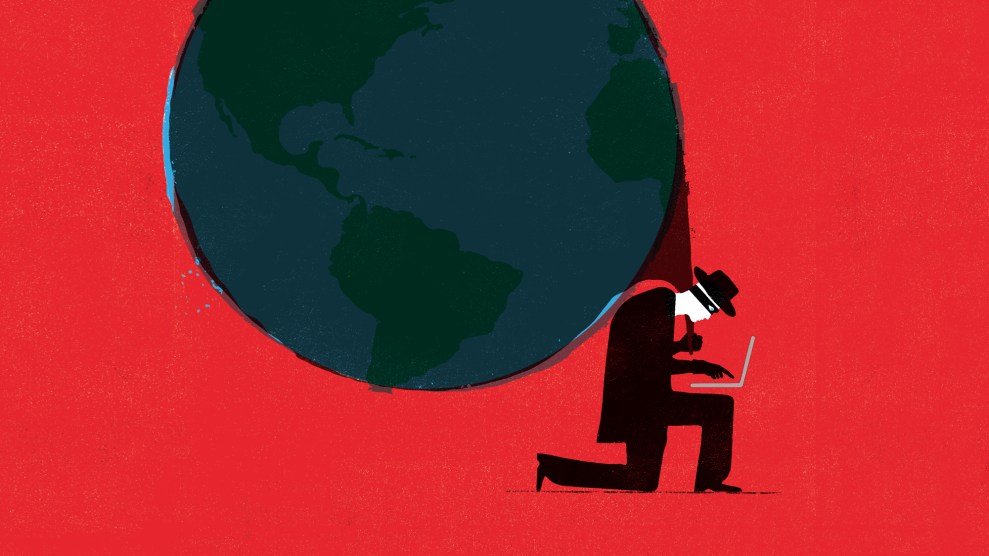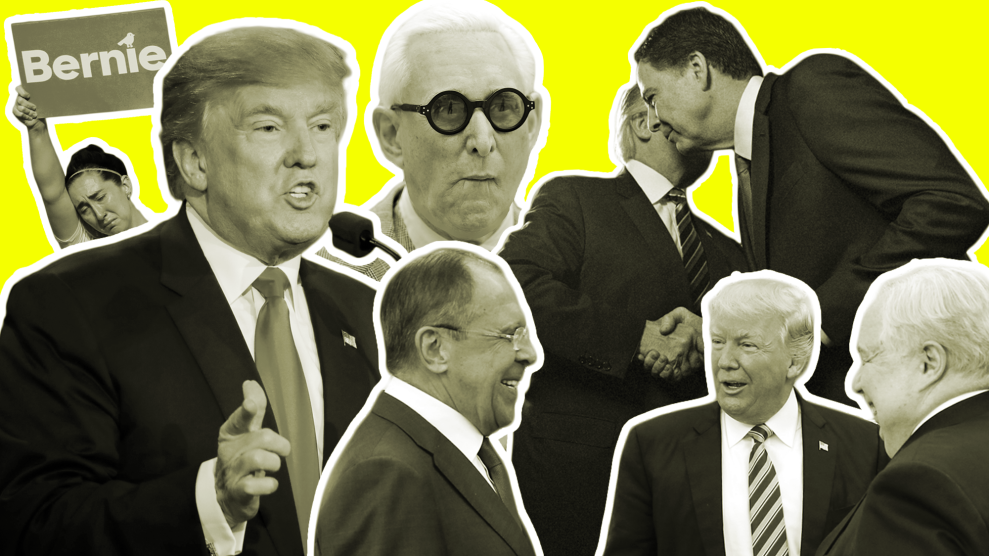
What does a 2009 controversy involving climate scientists have in common with Russia’s cyberattacks during the 2016 election?
Quite a lot, actually. Both incidents featured stolen emails, WikiLeaks, Donald Trump, and day after day of breathless, often inaccurate, media coverage.
Eight years ago, the prestigious Climatic Research Unit at the University of East Anglia was hacked, and thousands of private emails sent by scientists were dumped onto the internet—just weeks before crucial global warming negotiations were set to begin. We still don’t know much about who was behind Climategate, and investigators have found no compelling evidence that Russia was responsible. But for some of the victims of the 2009 hack, the 2016 campaign seemed eerily familiar.
Cybersecurity experts agree. “If you were a Russian operative [and] pitching influence ops for the DNC, and somebody’s like, ‘Eh, I don’t know about that,’ literally you just turn around and go, ‘Look at how well it worked [with Climategate],'” former National Security Agency analyst Jake Williams tells Mother Jones in our new feature story about the parallels between the two hacks. “I wouldn’t necessarily say one influenced the other, but certainly it’s good proof that that’s a technique that works.”
Here’s a timeline showing how the two events unfolded.
July 2009: Climate skeptic Steven McIntyre and his colleagues reportedly file 58 Freedom of Information Act requests in the span of a week, asking for raw data and email correspondence from scientists at the University of East Anglia’s Climate Research Unit (CRU). The university denies the requests.
Late summer through November 2009: Someone breaches a university backup server, downloading CRU files and emails sent by climate scientists around the world. The local police ultimately conclude that the “attack was conducted over a period of time” and on “certainly more than three” occasions.
11/17/09: A hacker breaks into RealClimate, a site run by prominent climate scientists, and attempts to draft a blog post about the hack. The post is never published, but someone does manage to upload a zip file containing the stolen emails—labeled “FOIA.zip”—to RealClimate’s comments section. The file is quickly removed, but not before a link to it is posted in the comments section of McIntyre’s Climate Audit blog.
11/19/09: The hacked emails gain attention. Links to the FOIA.zip file, which by now has been uploaded to an FTP server in Russia, appear in the comments sections of skeptic blogs. The skeptics focus their attacks on CRU head Phil Jones and on Penn State scientist Michael Mann, the researcher behind the iconic “hockey stick” chart showing the dramatic rise in global temperatures in the last millennium.
11/20/09: Mainstream outlets begin to pick up the story, leading with climate deniers’ accusations about what the emails reveal. The New York Times writes that the emails have caused “a stir among global warming skeptics, who say they show that climate scientists conspired to overstate the case for a human influence on climate change.”
Late 2009: Right-wing media goes wall to wall with coverage of the emails, claiming climate change is a global conspiracy. Rush Limbaugh says, “It looks like substantial fraud,” and he calls for the scientists involved to be “named and fired, drawn and quartered, or whatever it is.” After a conservative media watchdog organization demands that the major broadcast networks cover the “growing scandal,” the networks comply. “Have the books been cooked on climate change?” asks NBC’s Brian Williams at the start of one broadcast. “Did scientists skew their research to support theories about global warming?” asks ABC’s Charles Gibson. Conservatives demand an investigation of Mann.
11/21/09: WikiLeaks publishes the hacked emails.
11/24/09: Sen. James Inhofe (Okla.), the top Republican on the Senate’s environmental committee, launches a “Climategate investigation,” claiming that the basis for government efforts to address global warming “was contrived and fabricated.”
11/28/09: Penn State says it “is reviewing the concerns that have been raised” about Mann’s research.
12/1/09: Phil Jones steps aside as CRU’s director, citing the need to let an independent review run its course.
12/3/09: A key Saudi Arabian diplomat predicts Climategate will have a “huge impact” on upcoming global warming negotiations in Copenhagen, Denmark. “It appears from the details of the scandal that there is no relationship whatsoever between human activities and climate change,” he tells the BBC. “Climate is changing for thousands of years, but for natural and not human-induced reasons. So, whatever the international community does to reduce greenhouse gas emissions will have no effect on the climate’s natural variability.”
12/6/09: Donald Trump signs his name to a full-page advertisement in the New York Times a day before the Copenhagen summit. The letter calls for strong international and domestic action to fight global warming and notes that it “is scientifically irrefutable that there will be catastrophic and irreversible consequences” if leaders fail to act.
12/6/09: The vice chairman of the United Nation’s Intergovernmental Panel on Climate Change (IPCC) speculates that Russian intelligence may have orchestrated the Climategate hack, because of the Russian FTP server the hacker used to post the stolen emails; however, that server would have been available to anyone in the world.
12/7/09: Climate negotiators begin meeting in Copenhagen as Climategate continues to dominate US global warming coverage.
12/8/09: CRU scientists report they’re receiving death threats and facing harassment.
12/9/09: Sarah Palin falsely claims in a Washington Post op-ed that the Climategate emails “reveal that leading climate ‘experts’…manipulated data to ‘hide the decline’ in global temperatures.” She calls on President Barack Obama to boycott Copenhagen.
12/10/09: Twenty-six Republican senators send a letter to the United Nations’ secretary general requesting an independent investigation into the findings of the IPCC.
12/18/09: The Copenhagen talks end after failing to produce a meaningful agreement. The apparent Climategate hacker would later claim that his goal in releasing the emails was to disrupt the conference. (Negotiators blame policy disagreements rather than the emails.)
12/24/09 to 1/4/10: According to polling by Yale and George Mason University, 80 percent of conservatives who followed the Climategate scandal say they now have less trust in scientists as a result. Seventy-three percent say it has made them more certain that global warming isn’t happening. Sixty-nine percent of all respondents who followed the story, and 94 percent of conservatives, agree with the statement that “scientists changed their results to make global warming appear worse than it is”—an allegation later shown to be completely false.

February 2010: Two months after calling for climate action, Trump declares that global warming is a hoax—an allegation he’ll repeat many times in the years to come. Calling into Fox News after a major blizzard, he brings up the Climategate emails and falsely claims they showed scientists admitting their research is “a con.”
Early 2010: A “cap and trade” bill designed to limit domestic carbon emissions withers in the US Senate. By the spring, reporters are writing its obituary.
March 26, 2010: An anti-Semitic post on the white supremacist website Stormfront attacks Mann and other prominent scientists, who, according to the post, are behind the “climate change and carbon trading scams.”
April 2010 to August 2011: Nine separate investigations clear the scientists—including Mann and Jones—of wrongdoing and note that the scientific consensus on global warming remains strong. Investigators do criticize the University of East Anglia for dodging open records requests.
11/22/11: On the eve of another global climate conference, a new batch of 5,000 hacked emails are released and posted on a Russian server. Once again, the emails are disseminated via links in the comments sections of climate skeptic blogs. The hacker writes, “Today’s decisions should be based on all the information we can get, not on hiding the decline.”
December 2011: The US Department of Justice sends a letter instructing the parent company of WordPress to preserve records relating to the climate skeptic blogs that might be relevant to the 2011 email leak. (It’s unclear what ultimately became of this investigation.)
March 2012: Mann publishes The Hockey Stick and the Climate Wars, a book detailing his battles with climate change deniers and his experiences during Climategate.
7/18/12: Police in Norfolk, England, close the investigation into the CRU server breach, with no real leads. While the police have no suspects, lead detective Julian Gregory tells the Guardian that the “targeted” attack “appears to have been done with the intention of influencing the global debate on climate change.” Gregory concludes that the email dumps were timed specifically to disrupt the 2009 and 2011 climate talks.
3/15/13: Someone calling himself “Mr. FOIA” releases a third batch of emails, pens a note suggesting he was responsible for the original hack, and emails it to conservative bloggers. “It was me or nobody, now or never,” writes Mr. FOIA. “Combination of several rather improbable prerequisites just wouldn’t occur again for anyone else in the foreseeable future. The circus was about to arrive in Copenhagen. Later on it could be too late.”
December 2015: Six years after the failure in Copenhagen, nearly 200 countries agree to adopt the landmark Paris climate accord and commit to reduce global emissions. Trump calls US participation in the negotiations “ridiculous.”
7/22/16: Three days before the Democratic National Convention, WikiLeaks publishes nearly 20,000 hacked emails from the Democratic National Committee. Twitter bots are partially responsible for spreading the information. A persona named Guccifer 2.0, later connected to Russian intelligence, takes credit for the hack.
8/27/16: Senate Minority Leader Harry Reid (D-Nevada) asks the FBI to investigate the Trump campaign’s connections to Russia. “The prospect of individuals tied to Trump, WikiLeaks and the Russian government coordinating to influence our election raises concerns of the utmost gravity,” writes Reid.
10/7/16: The same day that US intelligence agencies say they are “confident” Russian entities were involved in the DNC hack, WikiLeaks begins releasing thousands of emails stolen from John Podesta’s private email account. The Podesta emails are released less than an hour after the Washington Post revealed a 2005 video in which Trump boasted about sexually assaulting women.
10/10/16: “I love WikiLeaks,” Trump says at a Pennsylvania campaign rally. Trump repeatedly promotes WikiLeaks during the final month of the campaign—at least 164 times, according to a ThinkProgress analysis of Trump’s speeches, media appearances, debates, and tweets.
11/8/16: Trump is elected president.
12/13/16: As Trump’s team prepares to take over the Environmental Protection Agency, a transition official asks the agency to turn over documents from the Obama-era EPA related to Climategate. His request is denied by career EPA officials.
1/20/17: Trump takes office.
6/1/17: Trump announces he will withdraw the United States from the Paris agreement.


















